Venezuelans engage in widespread protest against Presidential election results, murmurs arise of another mass exodus of migrants
The people moved forward toward the city center as the rain began to fall. The youth chanted slogans about charting their own future. I saw people walking barefoot. Older citizens mingled with children like some sort of utopia. After decades of being immersed in fear and hiding their political ideologies, people from many different beliefs descended – discontent but hopeful.
- 1 year ago
September 6, 2024
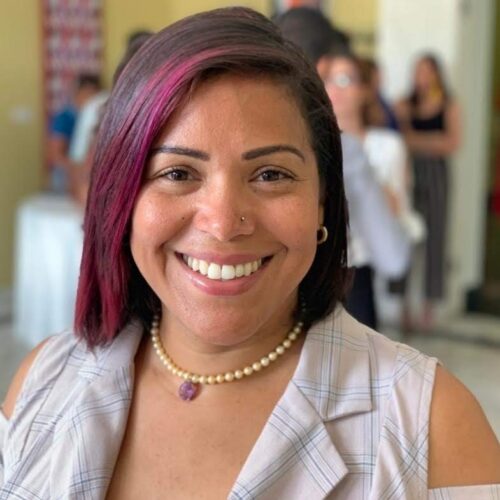
CARACAS, Venezuela ꟷ On July 28, 2024, Venezuelans voted in the presidential elections, full of hope and the desire for change. As citizens, we long faced a complicated situation here. With elections on the horizon, people began to express themselves more. They talked about their weariness with the status quo, and about all their family members who fled the country and live far away.
Unfortunately, the excitement of election day soon gave way to sadness, then to anger and fear. Many people like me felt deprived by the results. While we worried the government might persecute us, we marched into the streets anyway. We demanded what is ours and felt convinced that protest was the way to get it. Now, a month later, some seem resigned to this government, and another mass exodus may be on the horizon.
[According to a U.S. Department of State assessment of the election in Venezuela, “At least 12 million Venezuelans peacefully went to the polls and exercised one of the most powerful rights given to people in any democracy: the right to vote. Unfortunately, the processing of those votes and the announcement of results by the Maduro-controlled National Electoral Council (CNE) were deeply flawed, yielding an announced outcome that does not represent the will of the Venezuelan people.]
Read more stories from Venezuela at Orato World Media.
An energy of excitement permeated the neighborhoods on election day in Venezuela
As a community leader, I worked hard to organize people for election day in Venezuela. On Sunday, July 28, 2024, I strove to channel the emotions in the neighborhoods and to keep things peaceful. Organizing breathing, healing, and motivational workshops, we avoided confrontations. I felt excited to see neighbors actively participating, committed to bettering the country through peace and democracy.
We started very early, at 3:00 a.m., arriving at the polling stations. Despite it being nighttime, we saw great movement in the streets. People felt eager to vote and participate in this historic day. Lines formed early and by 4:00 a.m., they stretched everywhere. Waiting for the polling centers to open, I witnessed a joyful atmosphere. Walking along the lines, people hugged me and offered good wishes for the day.
Seeing such displays of happiness, hope, and civility in the neighborhood felt markedly unique. Speakers blared with festive music and people chanted slogans. The energy was organic. I tried to remain realistic, but a sense of excitement ran through me. “Don’t be naive,” I told myself. I knew the regime would not give up power so easily. Soon, I noticed the warning signs. The police began forming a presence at the polling stations. We used dialogue to diffuse tension, trying to stay as relaxed as possible.
At noon, a group of people who work for state agencies in the government arrived. As I monitored the polling station, I recognized them. We had become accustomed to these individuals intimidating people – speaking in a loud and harsh manner. This day, however, they seemed quiet, almost submissive. When they left, their faces revealed their low spirits, as if they knew they were defeated.
No one from either party celebrated the Presidential election results were announced
On election day we also fed more than 200 people, not matter what party they belonged to. We wanted to create a day of sharing and community unity. At my mother’s house, we cooked meals and snacks throughout the day. I told every neighbor I spoke to, “We have the same problems. We should make this day civil.” In return, I was met with smiles and gestures of kindness.
When the time came to close the polling stations, we kept the records in hand as proof in case someone tried to take away what we voted for. As the delegates of each party left the polling stations, it seemed clear who won. The pro-government representatives looked sad, with their heads hanging down. They barely responded when I told them, “It doesn’t matter who wins, we are going to build this country together.”
On the other hand, those for Edmundo Gonzalez came out crying with joy, completely convinced of his victory. In the neighborhood, the music grew even louder. People shouted with joy and sang loudly in celebration. The drinks flowed throughout the afternoon.
At my mother’s house, I gathered with a group of activists. My brothers and husband waited with me for the results. “They will not give up power easily,” I said. “Whatever they say, don’t be disappointed.” When I heard Madura was declared the winner by five million votes, instead of our candidate Edmundo Gonzalez I felt unsurprised.
Others felt differently, however. A collective disappointment quickly spread as the entire area fell silent. Not even the members of the ruling party celebrated. The music stopped and the normal fireworks never erupted. Instead, pots and pans began to bang and I heard angry voices. It all felt like a lie.
News of police aggression toward protestors in Venezuela reaches the neighborhoods
Having not slept for two days, despite my indignation, I collapsed in bed and fell asleep. The next day, I awoke early. I urgently took the election records to a safe place. The streets remained silent and the few neighbors I saw looked sad. “What are we going to do,” they asked. I responded, “Trust in God. Something good is going to happen.” For several hours, the people stayed quiet. Many skipped work that day.
At 10:00 a.m. I handed in the records and began to receive messages about demonstrations. People wanted to gather in the neighborhoods, especially mine. I asked my husband to take me, quickly. As if driven by an energy connecting the entire country, people emerged. No one organized it. They simply went out on their own. It felt so powerful.
The people moved forward toward the city center as the rain began to fall. The youth chanted slogans about charting their own future. I saw people walking barefoot. Older citizens mingled with children like some sort of utopia. After decades of being immersed in fear and hiding their political ideologies, people from many different beliefs descended – discontent but hopeful. Then, I noticed some young people wearing hoods and I called them over.
“Why are you like that,” I asked. They told me they were hit by tear gas. I quickly learned that in Chacaíto, security forces began repressing the demonstrators. The young people told me they were caught off guard as the violence grew out of control. “This is fucked up,” I thought, and I sprang into action. I pushed the people from my neighborhood back and continued getting them out until about 6:00 p.m. The police aggression never reached us, as I made sure those from my area remained out of harm’s way.
Venezuelan opposition leader goes into hiding
By Tuesday, July 30, 2024, things took a turn for the worse. I felt like I was in the middle of Kristallnacht in Nazi Germany. The government began to threaten, denounce, and persecute community leaders throughout the country. Through a mobile application called VenApp, photos of the homes and families of demonstrators against the regime were published.
The authorities took away many people I knew. On WhatsApp, audio and video clips circulated. They talked of buses carrying detainees out of the neighborhoods. I asked my husband to take me to where this was happening. We felt terrified but needed to confirm it for ourselves. By the time we got there, people were locked in their houses. It was like a curfew was in place. It felt like some psychological terror overtook their desire for change.
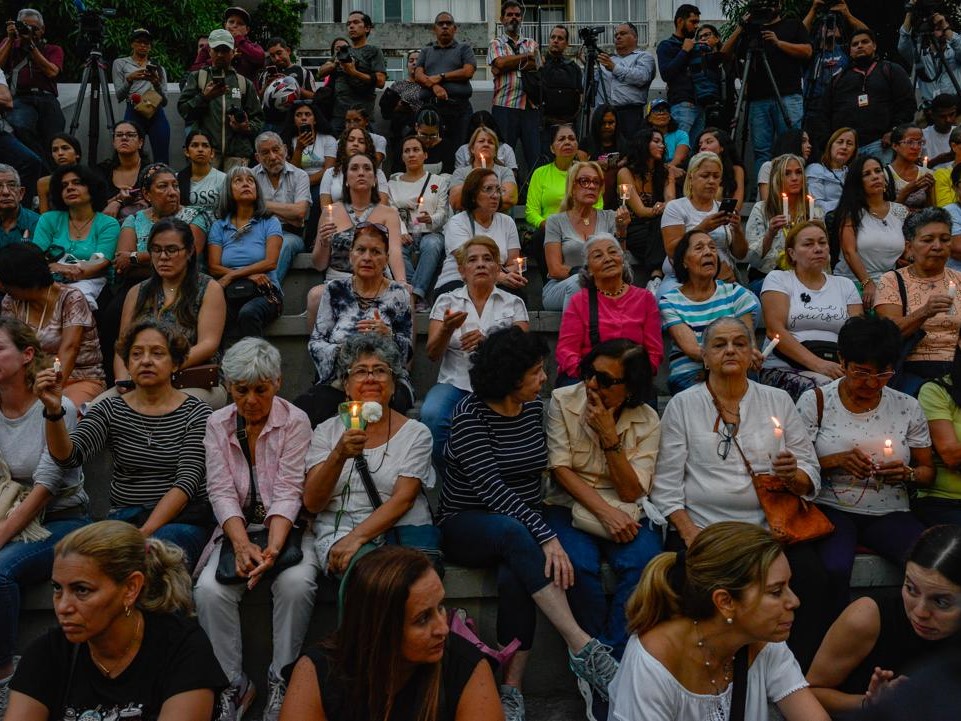
The fear of being killed or arrested dampened their desire to go out into the streets. Soon, a friend warned me, “You have to leave the neighborhood, Kati.” He heard news the authorities were coming for me. Full of rage, I blocked my social media accounts and installed a VPN so they could not track me on the internet. I hid my mother as well.
Rumors began to circulate about my arrest. I waited a few days and went into the neighborhood to reassure the people of my safety. I drove in on a motorcycle and spoke to the people before returning to my hideout. When the threat passed, I rejoined the demonstrations.
While some demonstrate in Venezuela, others begin another mass exodus of migration
Along with other activists from the city, we create strategies to prevent conflict from escalating. We know we could end up serving time as an excuse by the regime to repress us. Airing on the side of non-violence, we go out in groups for protection. I believe in a peaceful process of change. When I see demonstrators with hoods, I approach them and demand they remove it and uncover their face. This way, we ensure no one infiltrates us.
In one of the last demonstrations, 10 of us left the neighborhood. The remainder of the group felt too afraid of being arrested to come along. I understand their fear; it’s valid. I, however, refuse to stay locked up. With banners, we crossed through Petare and lines of the national guard and the government’s police without incident.
Next, we moved through a line of about 200 motorcycles, fearing they might beat us up. However, many people in the group knew me for my activism and let me through. It felt like walking through miles of wild hyenas, lions and tigers. Nevertheless, we arrived to the site safe and sound.
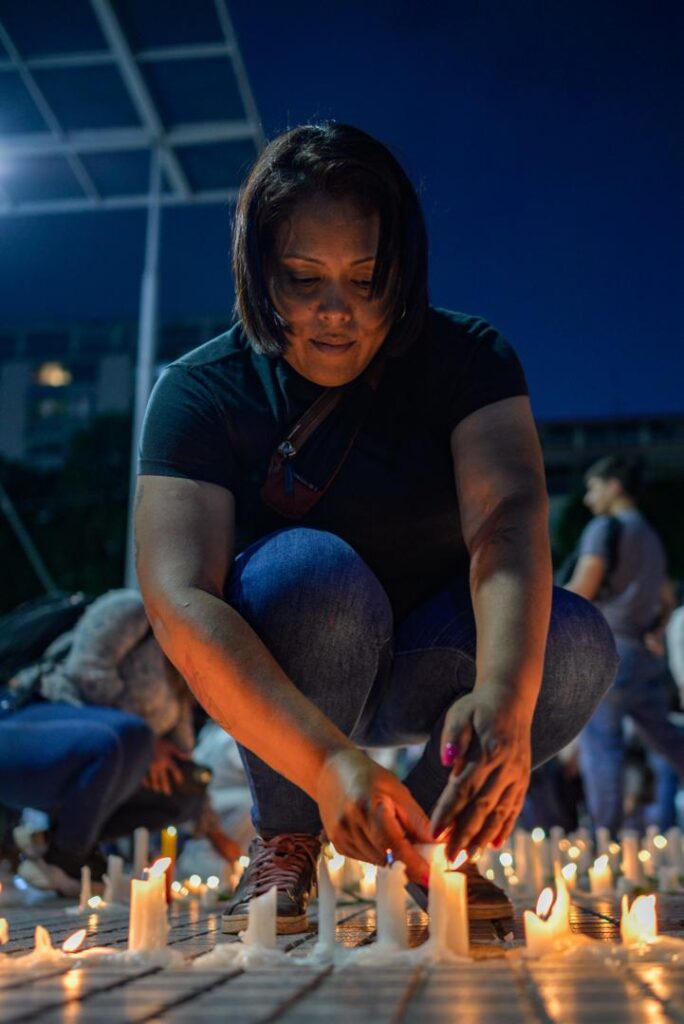
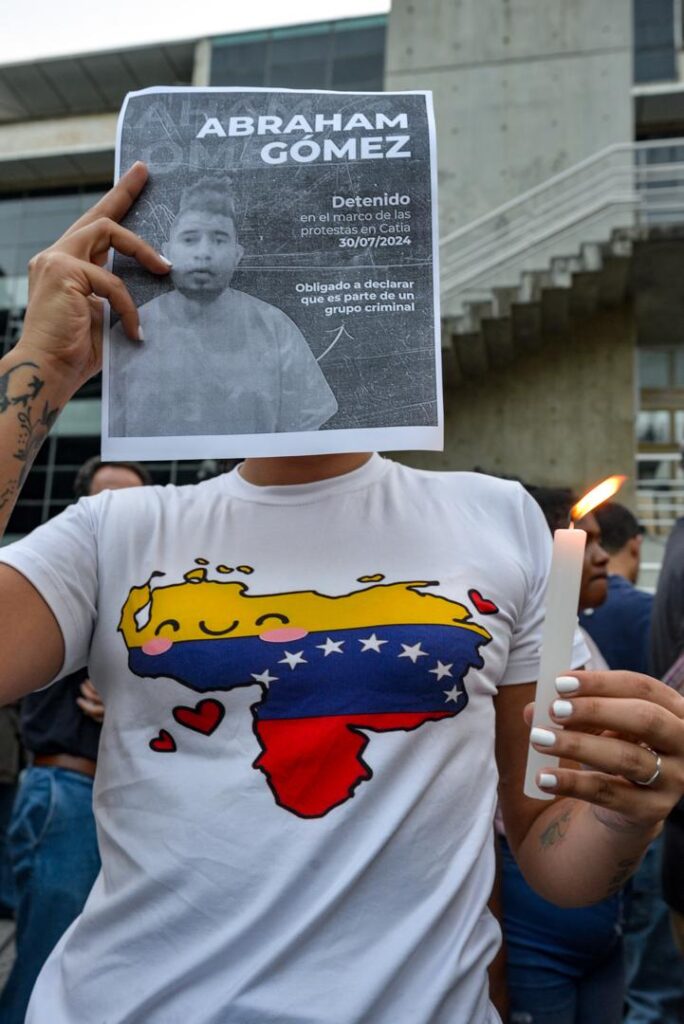
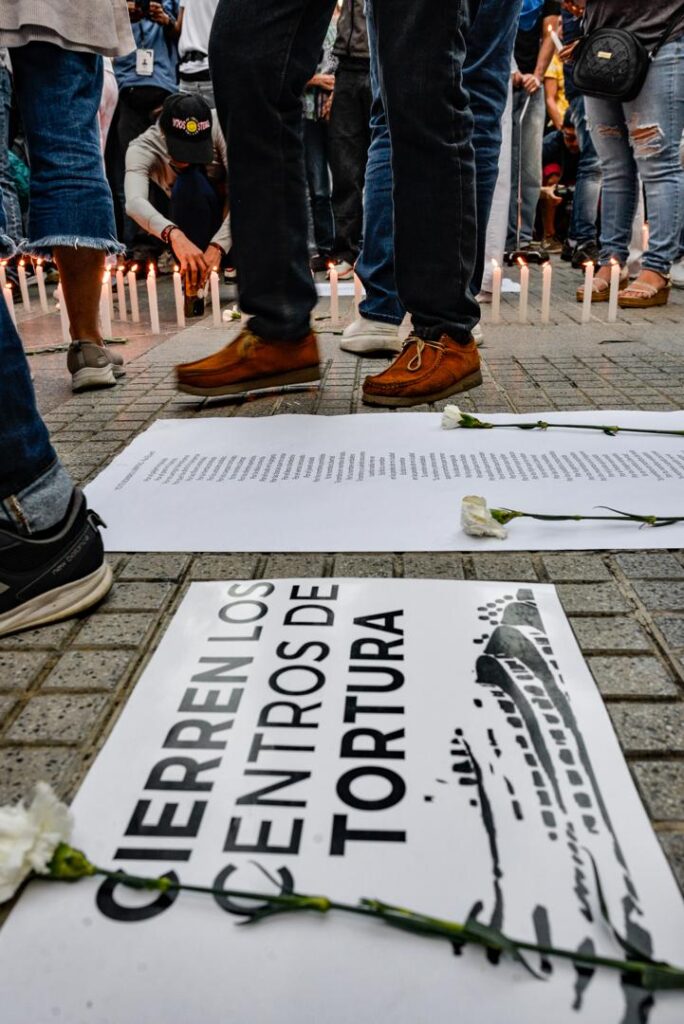
A month passed since election day, and some people resigned themselves to the results. My cousin left Venezuela with her children. Before the vote, I heard many people promise to leave if the government prevailed again. This new exodus has already begun. For me, I keep hope firmly in place. I believe things happen beneath the surface we citizens remain unaware of. I believe the world raises its voice in support of us.
Amid the darkness, we must value that; to see it as a ray of light and continue pushing for change. Sometimes, I think my profile – being known in the neighborhoods – keeps me safe. Other times, I wonder if the government will arrest me at any minute. I remind my family of the possibility, but I continue my life and my activism. I will not stay silent nor hide; I am not a criminal, and I will fight for my country.
All photos courtesy of Juan Calero.



































































































































































































































































































































































































































































